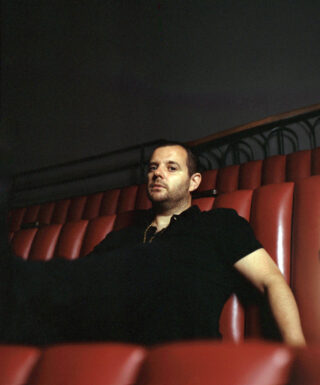Today, Lupe has graced Atlantic Records with his size nine biker boots, jewel-incrusted timepiece, indoor shades and obligatory low-slung jeans. We find him in the label’s velvety artists’ lounge, high above Kensington High Street, west London. And while he is lying on a sofa rather than in a Jacuzzi, alone and unarmed rather than surrounded by string bikinied girls and semi automatic weapons, he looks unquestionably like an international rap star. He’ll not stand for the glorification of pimps, pistols and shiny things, but he clearly enjoys some of the materialistic perks that come with being Lupe Fiasco.
His gun collection is easily explained – Lupe’s father was a military man who taught his son to shoot at an early age. “It wasn’t for the sake of robbing someone else or defending your turf in a drive-by,” he insists, “my father introduced me to guns by means of defending your family, but also by means of sport.” As for the Ferrari collection, that might take a little more explaining.
“I do have the things that a ‘conscious rapper’ shouldn’t have,” he admits. “My cheapest Ferrari cost me $13,000 dollars and it’s a piece of trash, but at the end of the day it’s still a Ferrari.”
And because it’s still a Ferrari that must fuck some people off.
“Certainly,” he nods. “It funny because I walk this line. There are some things that I’m challenging and there are some people who are on my side when challenging these things that would be adverse to what I have. Like, ‘you shouldn’t have that because you’re conscious of it…’
“It’s weird because there’s a duality in it all because there’s some things that I relate to, because I come from the streets; I come from the ghetto; I come from the have-nots. And I’ve been at the have-somewhat-more, AND I’m part of the haves! So when you put that scale on it there’s some things you aspire to and want that are grossly material, just for the sake of saying you have it and driving up in your car and saying, ‘Heeey, look at me!’ But there’s a difference between that and it being something that consumes you and takes over your whole life. Because there are some things that people can’t afford, and there’s a certain kind of injustice that is being done by dangling that in front of peoples’ faces, because some people will do anything to get that.”
Lupe admits “there’s a hypocrisy with me” but also notes that it’s a trait that lives in all human beings from all walks of life, not just in young, earnest rappers who then make enough money to buy the things they’ve always wanted. “Part of my responsibility is to say, ‘Look, I’ve got this and it’s not worth it,’” he says. And he points to his biggest single yet as an example of what it is he’s trying to achieve with his bitch-less lyrics.
“The stories I like to tell are about the non glamorous side of the glamorous things,” he explains. “Take ‘Superstar’, where, yeah, it is about fame and fortune and blah blah blah, but it’s also the black, dark side of it that they don’t tell you on the videos. You see the video girls but you don’t see the heartache and pain and the destruction and the drug abuse and alcoholism.”
At five or six Lupe was first introduced to NWA (again, by his father), which he hated. As ‘Hurt Me Soul’ from ‘Food & Liquor’ attests, it was “because the women were degraded.” He much preferred his dad’s curse-free Queen and Foreigner records, and Ravi Shankar. But by the time he was in Junior High, the group Lupe mimicked was none other than that of Dre’s and Ice Cube’s, so much so that he rapped under the name MC Ren, his rap partner called himself Easy-E and they even called themselves NWA. “We had a DJ Yella,” he says. “We had the whole click.”
But it wasn’t the lyrics and themes on ‘Straight Outta Compton’ that Lupe was paying most attention to – it was how they put the songs together. The same went for prolific gangsta rapper Spice 1, who Lupe says unwittingly taught him how to make a concept record when he released ‘187 Proof’ – a track through which bottles of alcohol were turned into characters in the street.
“I was like, ‘Wow! You can do that?!’” Lupe remembers. “I lived across the street from the liquor store so I knew all of these names he was saying. It was inspiring. It taught me how to tell a story. Without Spice 1 and ‘187 Proof’, you could argue that I would have never made [debut single] ‘Kick Push’.”
This love/hate relationship with aggressive hip hop is something that remains with Lupe to this day. He thinks that Rick Ross – “the most gansta of gangsta rappers” – is “dope.” But that didn’t stop him from following Ross’ track ‘B.M.F. (Blowing Money Fast)’ with his own version called ‘Building Minds Faster’.
“Gangsta rap is entertaining,” says Lupe, “and I come from that, so I can relate to what Rick Ross is saying. Do I combat it? Yes. When he made ‘Blowing Money Fast’ did I make ‘Building Minds Faster’? Yes I did. Because I don’t want my son saying that he wants to be [Detroit drug lord] Big Meech or [Chicago gangster] Larry Hoover, and I don’t want your son saying that. I want him to have the opportunity to say, ‘I wanna be Malcolm X or Martin Luther.’ Let’s give them both options to choose from, because if kids only want to be Larry Hoover he’s serving a 150 year prison sentence!”
‘Building Minds Faster’ was more than a smart reply to a track that made heroes of infamous gang bosses, though. It also served as a thank you to Lupe’s fans who had petitioned Atlantic Records to finally release ‘Lasers’ – an album that they were first told would be released in late 2009.
“At first people would ask me when ‘Lasers’ was coming out and I’d say, ‘It’s coming soon,’” says Lupe, “but then it got to a point where I had to say, ‘I don’t know’. And then I’d say, ‘Look man, ask Atlantic Records.’”
People did and the response they got was one they’d already heard – ‘Lasers’ will be coming soon. Well, that wasn’t good enough anymore, so an online petition was started by two teens from New Jersey and within six hours 5,000 people had signed it. CNN, MTV and VillageVoice all reported the story as the signature count rapidly rose (at last count it had garnered over 32,000 names) and message boards started to talk of a protest outside the label’s headquarters in New York City.
“You could watch it happening,” remembers Lupe. “Some dude posted on a message board, ‘Yo, we should protest!’ Next post: ‘What do we need to protest?’ Next post from another kid: ‘I know we need a permit.’ Then: ‘Ok, where do we get that?’ Then, up pops an address. Then: ‘We need a lawyer…’ And it just snowballs into a website and a thousand people are suddenly planning on flying to New York, and car pools are being organised…”
Lupe laughs. What became known as Fiasco Friday (when fans did protest at Atlantic Records on October 15th 2010) is clearly a proud moment for him; proof that his music has instilled a sense of activism in young music fans, just like he’s always wanted. But he believes that it wasn’t a song or album that did this – it was a manifesto he posted online a couple of years ago.









